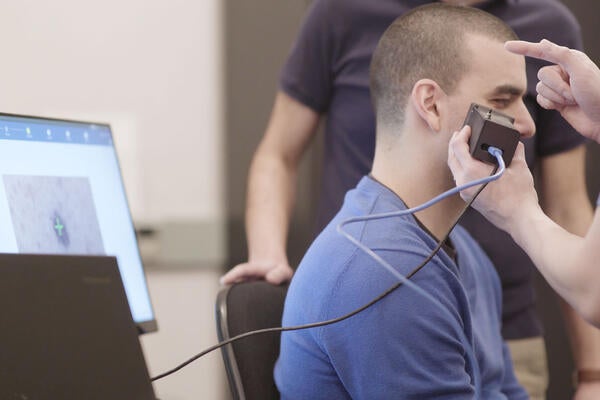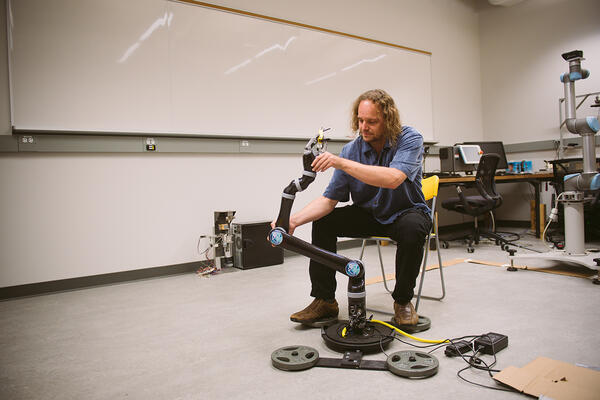
The making of an artificial kidney
Qidni Labs is building an artificial kidney with the hope of dramatically improving survival rates for patients with kidney failure

Qidni Labs is building an artificial kidney with the hope of dramatically improving survival rates for patients with kidney failure
By Rose Simone University Communications
Morteza Ahmadi PhD'13
PhD Alumnus, Faculty of Engineering
> Co-Founder, Qidni Labs
> Velocity Garage
When Morteza Ahmadi visited a dialysis clinic he saw what kidney dialysis patients endure.
“Patients suffer a lot, physically and mentally, and so do their families. The technology hasn’t changed that much in decades,” Ahmadi says. “Liberating patients from the dialysis process would be an amazing thing.”
Ahmadi has a PhD in systems design engineering from the University of Waterloo and the Kidney Foundation of Canada gave him a fellowship to develop new technologies for patients with kidney failure.
Ahmadi saw people who typically had to travel to the dialysis clinic three times a week to be hooked up to the machines for four hours at a time, in order to have their blood filtered and cleaned because their kidneys are not functioning well.
More than two million people around the world suffer from end-stage renal disease, an illness that ties them to these regular dialysis treatments.
After graduating in 2014, Ahmadi launched his company, Qidni Labs, to continue the development of the artificial kidney. Qidni Labs now operates out of the University of Waterloo Velocity Garage space. Ahmadi is also supporting future innovators by donating a portion of his company’s success to Waterloo’s Startup Pledge program.
Most people take their kidneys for granted, but these organs are quite amazing, Ahmadi says. They filter more than a liter of blood a minute and hundreds of litres a day. They separate out the waste and excess water from the blood, which then gets expelled in the form of urine. The clean blood is reabsorbed back into the bloodstream.
Ahmadi and his team at Qidni Labs spent two years developing a nanofilter device that mimics the filtration function of the kidney. Qidni Labs now has a device that is being tested on animal models such as sheep. That testing will continue over the next 18 to 20 months.
“Our long-term vision is for a device that can be implanted in the body, but initially, the first product that we hope to be able to bring to market would be an external, wearable and miniaturized device that the patients would be carrying with them,” Ahmadi says.
It‘s not an easy project. “It is hardware and it is highly regulated and it does involve the safety of patients so we have to go through a lot of design prototyping and iteration to make sure that we consider every aspect before we can start testing it on patients,” he says.
The biggest challenge is understanding the key requirements to get the job done, he adds. “We work closely with clinicians, physicians, nephrologists and surgeons to get a good understanding of the clinical requirements for a device like this and to make sure it has clinical value.”
The company is also working with the FDA to get ready for the regulatory approvals that will be needed.
Although an artificial kidney is a difficult and long-running project, it is also an enormously satisfying one for the team. It has the potential to vastly improve the quality of life of so many people. A device that is able to filter the blood on a more continuous and daily basis could dramatically improve the survival rates for kidney patients, Ahmadi says. Dialysis also costs more than $80,000 per patient per year on average in North America, so it would relieve the burden on the health care system as well.
There are many teams around the world that are now working on new technologies for kidney dialysis, and all of the advances that are being made will be important for patients, he adds. For kidney patients and their families, “the future looks bright,” Ahmadi says.

Read more
How innovative research and medical technology can prevent falls

Read more
Research breakthrough provides state-of-the-art skin cancer screening by combining deep-learning AI with deep-tissue scans

Read more
How Waterloo’s artificial brain is powering the next tech revolution
The University of Waterloo acknowledges that much of our work takes place on the traditional territory of the Neutral, Anishinaabeg and Haudenosaunee peoples. Our main campus is situated on the Haldimand Tract, the land granted to the Six Nations that includes six miles on each side of the Grand River. Our active work toward reconciliation takes place across our campuses through research, learning, teaching, and community building, and is co-ordinated within the Office of Indigenous Relations.